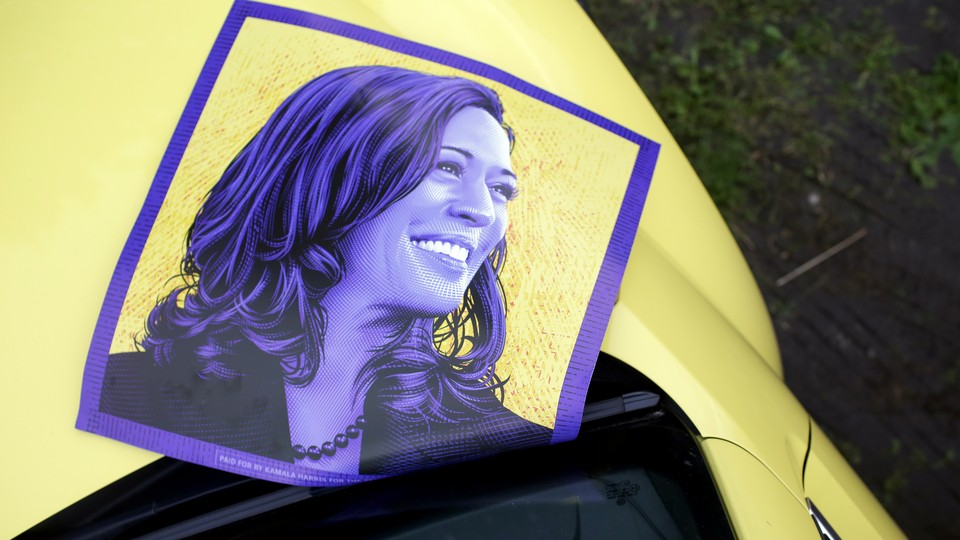Can Memes Really Win Elections?
6 min read
This is an edition of The Atlantic Daily, a newsletter that guides you through the biggest stories of the day, helps you discover new ideas, and recommends the best in culture. Sign up for it here.
In some corners of the internet, Kamala Harris is the main character. Will her viral moment serve her?
First, here are four new stories from The Atlantic:
- J. D. Vance has a point about Mountain Dew.
- Kamala Harris’s diversity hire
- Adrienne LaFrance: American fury
- The party is not over.
A Fine Line
On Sunday, some of the most notable people in the world were posting some of the most consequential statements of modern American history on social media. But there was one post from a lesser-known figure that none of the frenzied political reporting of recent weeks prepared me for: “kamala IS brat,” the pop singer Charli XCX declared. With three words, XCX, a pop diva of the summer, validated the likely Democratic presidential nominee (to be clear, being “brat”—the title and central concept of her latest album—is a good thing).
The internet, to paraphrase another XCX lyric, went crazy. Fans of XCX, who has dominated dance-music charts and captured a young and very online corner of the internet this summer, shared a slew of video edits of Harris with XCX’s songs in the background. Harris’s own rapid-response account on X quickly updated its banner image to “kamala hq” in the font and color scheme of Brat.
Sunday was a banner day for Harris online (and, you know, in real life). The internet was ready for her: Over the past month, a steady stream of clips and memes of her zaniest moments, including her widely shared quote from her mother, “You think you just fell out of a coconut tree?,” have been getting traction. Harris has long had an energetic online fan base—the so-called #KHive rallied behind her in 2020—but she herself does not often post beyond standard politician fare. That may be part of why the flickers of engagement from her campaign’s account over the past few days—and the clips positioning the candidate as a fun pop-cultural figure—have delighted her fans so.
The posts are fun, but they may not hold much value for Harris beyond that. Harris’s team should “keep in mind that the ‘extremely online’ population doesn’t necessarily represent the demographics or worldview of the rest of the country,” Caitlin Chin-Rothmann, a fellow focused on technology at the Center for Strategic and International Studies, told me in an email. For all the people excited about the recent memes, many are baffled at, or simply uninterested in, the Brat and coconut-tree discourse. (XCX, although beloved by her fans, is also more of a niche cultural figure than a mainstream pop star.)
If Harris indeed becomes the Democratic nominee, she will want, to state the obvious, to earn as many votes as possible. Getting the age group likeliest to be on TikTok and listen to XCX to vote for her could only help. “The youth vote is not large—they’re one of the lowest-turnout groups in the country—but they’ve leaned strongly Democratic in recent cycles,” Seth Masket, the director of the Center on American Politics at the University of Denver, said in an email. “It’s likely Biden wouldn’t have won in 2020 without their strong support. Engaging them seems particularly important, if not by itself sufficient.”
Still, equating online activity with voting trends is a dangerous game: “Social media is mostly a reflection, not a cause, of political behavior,” Dean Lacy, a government professor at Dartmouth, noted to me via email. Research has not borne out a link between social-media traction and the results of an election, he added. It’s too early to see how Harris would play among young people on Election Day, and the picture based on the polling thus far is mixed. (Much of that polling was conducted before she became the likely nominee, so the findings may yet shift as her presence in the race turns from a hypothetical to a real possibility.) CNN polling conducted late last month found that although slightly more people aged 18–34 supported Harris than Donald Trump, she lagged behind other Democrats who saw more support in recent elections.
So what is a buzzy online moment worth? Normally, Masket said, he wouldn’t see a huge advantage from this type of online flurry. But young people seemed “incredibly unenthusiastic” about Joe Biden as the nominee, so targeting Gen Z with memes and cultural references may help engage them. And Harris’s campaign doesn’t have much time to spare in bringing aboard the undecided among those voters.
The line between participating in an online joke and being cringe is a thin one. Harris is teetering on that line right now—and so far, she’s on the right side of it. It helps that most of the posts and memes are coming from her fans, not from her or her campaign. But the positive online energy could quickly curdle, my colleague Charlie Warzel reminded me, if voters perceive a gap between how Harris acts and how she posts. “If she runs a very staid, normal political campaign, then I think it will feel very inauthentic and cringey if her staff tries to make her seem Extremely Online,” he said.
The value of these memes, for Harris, is in what they prove about her candidacy. After months of controlling Biden’s public appearances, the Democrats now have a candidate they can proudly draw attention toward. Harris, as Charlie told me, can “take some of the oxygen away from the Trump campaign. That ability is more of an asset than any set of memes.”
Related:
- The brat-ification of Kamala Harris
- The Harris gamble
Stephanie Bai contributed research.
Today’s News
- Vice President Kamala Harris reportedly has enough support from Democratic delegates to become the party’s nominee in the presidential race.
- Secret Service Director Kimberly Cheatle resigned after facing intense scrutiny over her agency’s failure to prevent the assassination attempt on Donald Trump.
- Senator Robert Menendez will resign next month after he was recently found guilty of federal bribery and conspiracy charges.
Dispatches
- The Weekly Planet: Fast-moving storms mean that planning for an evacuation is much harder now, Sara Sneath writes.
Explore all of our newsletters here.
Evening Read

Why I Buy German Toothpaste Now
By Sarah Zhang
For as long as I can remember, I have bought into the gospel of fluoride, believing that my teeth would surely rot out of my head without its protection. So it felt a little bit illicit, recently, when I purchased a box of German fluoride-free kids’ toothpaste for my daughter. The toothpaste came in blue, understated packaging—no cartoon characters or candy flavors—which I associated with German practicality. And instead of fluoride, it contained an anticavity ingredient called hydroxyapatite, vouched for by several dental researchers I interviewed for this story. Could it be, I wondered as I clicked “Buy,” that toothpaste doesn’t need to contain fluoride after all?
Read the full article.
More From The Atlantic
- There are no good options left with bird flu.
- Netanyahu’s folly
- The emerging bipartisan wokeness
- The wannabe tough-guy presidency
- How sports got so whiny
- Retirement gets harder the longer you wait.
Culture Break

Listen. In the latest episode of Good on Paper, Atlantic writer Jerusalem Demsas interviews the happiness expert Arthur C. Brooks about whether religion can truly cure loneliness.
Read. These eight books about the thrills of competition and pushing one’s limits will inspire people to move their body.
Play our daily crossword.
P.S.
I’ll leave you with this video of Stephen Colbert (a.k.a. “Stephen Colbrat”) performing the viral Charli XCX “Apple” choreography on his show last night. I give him credit: The dance is pretty difficult to learn.
— Lora
Stephanie Bai contributed to this newsletter.
When you buy a book using a link in this newsletter, we receive a commission. Thank you for supporting The Atlantic.



